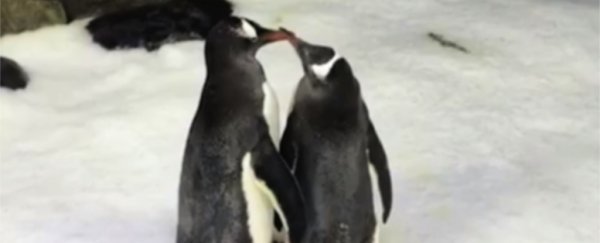Sphen wanted to show Magic how much he meant to him.
The male gentoo penguin grasped a wet, heart-shaped stone in his beak, waddled to Magic's nest and plopped it down to buttress their nest.
It is a sign of courtship, experts have said, but also practicality. Magic needed to stay huddled over their egg, using rocks to help insulate and warm it. And Sphen patrolled to protect them both until their adopted chick was ready to meet them.
Their foster chick was born Oct. 19 in Sydney, weighing 91 grams — less than an apple, the Sea Life Sydney Aquarium in Australia noted.
The two male penguins had become inseparable ahead of breeding season, taking swims and walks around the Penguin Expedition. They were given a celebrity hybrid name — Sphengic — and a dummy egg to look after, the aquarium said.
Magic and Sphen were dutiful even with the fake egg. The staff upgraded to a real egg from a couple that already had another egg.
The dads swapped duties, the aquarium said, as one hunched over the egg and the other stood sentinel to ward off stone thieves lurking for nest material.
And last week, the chick picked its way through the egg.
BABY SPHENGIC IS HERE! 🐧😍🎉 Born Friday 19th October @ 5:46pm, weighing just 91g! Gender TBC in 2 months. Both dads are doing well and are so in love with their precious bub. 🐧🐧 Full story: https://t.co/3Nllhq3N3o #BabySphengic pic.twitter.com/yESrjbLXqI
— SEA LIFE Sydney Aquarium (@SEALIFESydney) October 26, 2018
"Baby Sphengic has already stolen our hearts! We love watching the proud parents doting and taking turns caring for their baby chick," said Tish Hannan, the aquarium's penguin department supervisor, though the chick won't have an official name until its gender is determined in two months.
Hannan told ABC that same-sex relationships between penguins are not uncommon, though it is rare for a same-sex pair to raise a chick together.
The next 20 days are crucial for the chick's life, Hannan said. It needs a loving environment to thrive.
So far, Magic and Sphen "are co-parenting exceptionally well to raise their young," the aquarium said.
The aquarium has depicted the pair as "love birds," replete with rainbow emojis and the hashtag #LoveWins — popularized after the U.S. Supreme Court ruled in 2015 that same-sex marriage is a national and fundamental right.
But are the penguins actually homosexual? The answer is a bit more complicated in the animal kingdom, experts have warned, with human ideas of companionship and sexuality often projected onto animals.
As The Washington Post's Karin Brulliard reported in 2016:
Some animals do form same-sex partnerships, and a lot more of them display homosexual behavior from time to time, said Paul Vasey, a psychology professor at Canada's University of Lethbridge who has long studied female Japanese monkeys that mount each other during mating season.
But those behaviors happen so sporadically in most species that there is not enough data to build solid studies on — or draw conclusions about whether any of those animals are actually "gay" — Vasey said.
"Whether there's any kind of same-sex sexual preference going on, that's left entirely to the imagination in the sense that the data just don't exist to demonstrate one way or the other," he said. Being "exclusively gay, so to speak … is exceptionally rare in the animal kingdom."
Two male chinstrap penguins at the Central Park Zoo in New York captivated onlookers after they paired off in 1998 and also parented a chick in captivity, though Roy and Silo eventually split in 2005, the New York Times reported.
Silo paired with a female named Scrappy. And Roy, apparently distraught over the loss, sequestered himself in a corner and stared at a wall.
Their more happy times were depicted in the 2005 children's book "And Tango Makes Three," about the couple parenting their chick in the zoo. It was heralded as a guide to explaining same-sex parenting to children but sparked outrage in the United States and elsewhere.
It was the most challenged book for each of the three years after publication, the American Library Association said, and Singapore banned it from libraries in 2014.
But for the time being, it perhaps doesn't matter a whole lot whether Magic and Sphen are romantically or platonically linked. Their focus for the next two months, the aquarium said, will be to feed their chick up to 10 times a day.
Its fluff will shed, feathers will grow in, and the chick will learn how to swim — not far from where its two fathers found each other.
2018 © The Washington Post
This article was originally published by The Washington Post.
